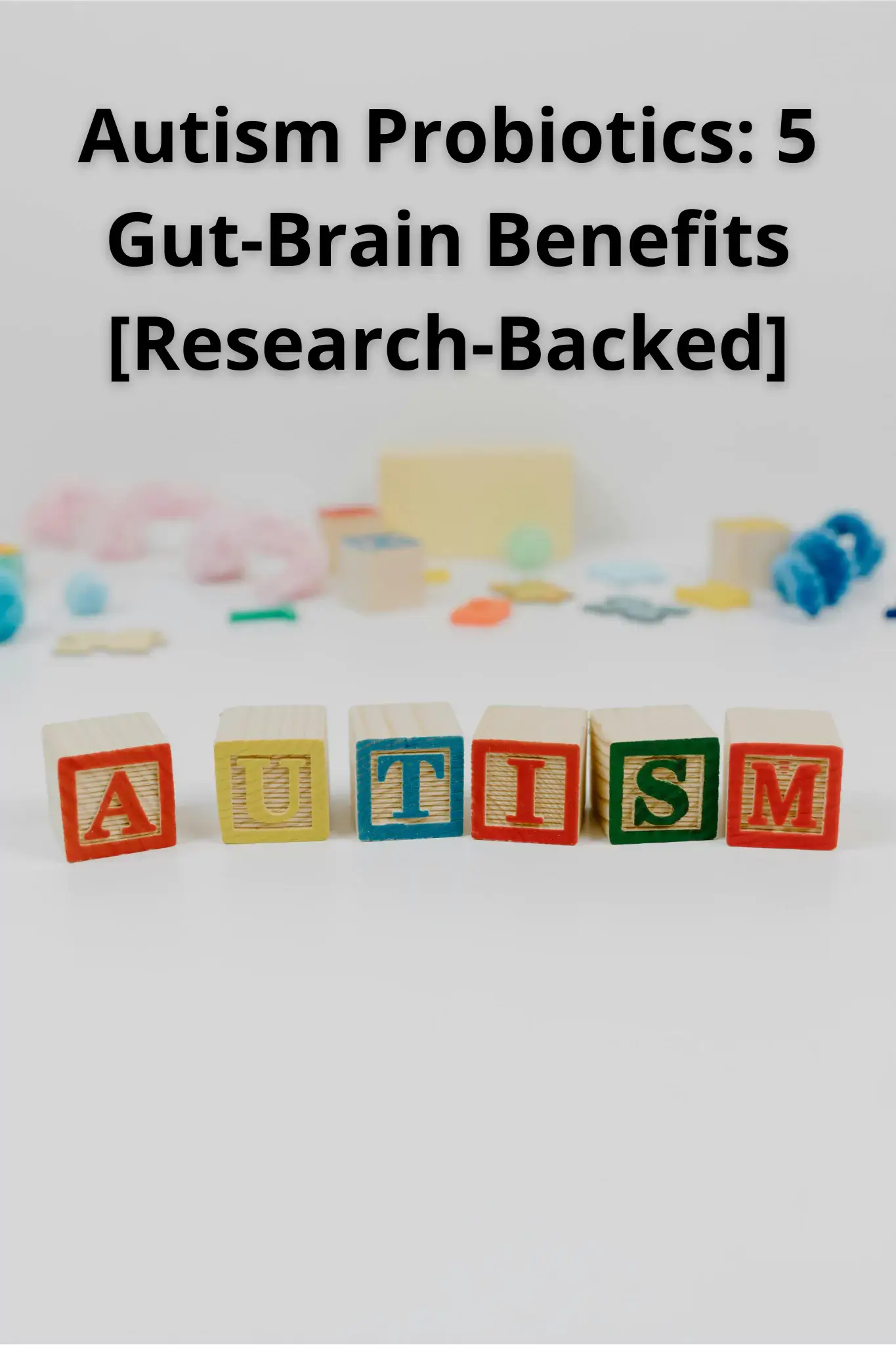With 9 years of experience in the kitchen, I’m passionate about crafting delicious recipes and sharing them with food lovers worldwide. 🍽️✨ Whether it’s a comforting homemade dish or a creative cocktail, my goal is to make cooking fun, easy, and enjoyable for everyone. Join me on this flavorful journey! 🍹🥗

Autism Probiotics: 5 Gut-Brain Benefits [Research-Backed]
Autism Probiotics: 5 Gut-Brain Benefits [Research-Backed]
The gut-brain axis, a bidirectional communication network linking the gastrointestinal tract and the brain, has emerged as a crucial area of research in understanding various neurological conditions. Among these, autism spectrum disorder (ASD) has shown a significant correlation with gut health. This article delves into the potential of probiotics for autism to improve gut health and, consequently, alleviate some behavioral symptoms associated with ASD. We will explore the science-backed strains, potential benefits, and how these probiotics might contribute to a better quality of life for individuals with autism. The potential impact of gut-brain probiotics cannot be ignored given the increasing research pointing towards the gut-brain connection.
Why Gut Health Matters in Autism
The gut microbiome, the complex community of microorganisms residing in our digestive tract, plays a vital role in various physiological processes, including digestion, immune system regulation, and even brain function. Research suggests that individuals with autism often exhibit imbalances in their gut microbiome, a condition known as dysbiosis. This dysbiosis can lead to various gastrointestinal issues, such as constipation, diarrhea, and abdominal pain, which are more prevalent in autistic individuals than in the general population. The altered gut environment may contribute to behavioral symptoms associated with ASD. For example, increased gut permeability (“leaky gut”) can allow harmful substances to enter the bloodstream and potentially affect brain function. This highlights the importance of exploring interventions like probiotics for autism that aim to restore a healthy gut microbiome.
Furthermore, the gut produces neurotransmitters, such as serotonin and dopamine, which play crucial roles in mood regulation and behavior. An imbalanced gut microbiome can disrupt the production of these neurotransmitters, potentially exacerbating behavioral symptoms in individuals with autism. This intricate relationship between the gut and the brain underscores the need for strategies that target gut health to improve overall well-being in individuals with ASD. Considering gut-brain probiotics is a proactive step in addressing this complex issue.
Potential Benefits of Autism Probiotics
Probiotics for autism are live microorganisms that, when administered in adequate amounts, confer a health benefit on the host. In the context of autism, these probiotics aim to rebalance the gut microbiome and improve gut health. Emerging research suggests that gut-brain probiotics may offer several potential benefits for individuals with ASD:
- Improved Gut Health: Probiotics for autism can help restore a healthy balance of gut bacteria, reducing gastrointestinal symptoms like constipation and diarrhea. This improvement in gut health can lead to increased comfort and improved overall well-being.
- Reduced Behavioral Symptoms: Some studies have shown that gut-brain probiotics may help reduce behavioral symptoms associated with ASD, such as anxiety, irritability, and repetitive behaviors. While more research is needed, the initial findings are promising.
- Enhanced Nutrient Absorption: A healthy gut microbiome is essential for optimal nutrient absorption. By improving gut health, probiotics for autism can enhance the body’s ability to absorb essential nutrients, which can support overall health and development.
- Improved Immune Function: The gut plays a crucial role in immune system regulation. Gut-brain probiotics can help strengthen the immune system, potentially reducing the risk of infections and allergies.
- Modulation of Brain Function: The gut-brain axis allows for bidirectional communication between the gut and the brain. Probiotics for autism may influence brain function by modulating neurotransmitter production and reducing inflammation in the gut, potentially improving cognitive function and behavior.
While these potential benefits are encouraging, it’s essential to remember that research is ongoing, and the effects of gut-brain probiotics can vary from person to person. Consulting with a healthcare professional is crucial before starting any new probiotic regimen.
Science-Backed Probiotic Strains for Autism
Not all probiotics are created equal. Different strains of probiotics have different effects on the body. When considering probiotics for autism, it’s important to choose strains that have been specifically studied for their potential benefits in individuals with ASD. Some science-backed strains that have shown promise in research include:
- Lactobacillus rhamnosus GG: This strain has been shown to improve gut health and reduce gastrointestinal symptoms in children with ASD. It may also have beneficial effects on anxiety and behavior.
- Bifidobacterium infantis: This strain is naturally abundant in the gut of infants and plays a crucial role in immune system development. Studies suggest that it may help improve gut health and reduce inflammation in individuals with ASD.
- Lactobacillus plantarum: Some research indicates that this strain can improve cognitive function and reduce anxiety in individuals with autism.
- Bifidobacterium breve: This strain has demonstrated potential in reducing the severity of ASD symptoms, including social interaction difficulties and repetitive behaviors, according to some studies.
- Saccharomyces boulardii: While technically a yeast, *Saccharomyces boulardii* has probiotic properties and may help reduce diarrhea associated with antibiotic use or gut dysbiosis.
It’s important to note that the research on specific probiotic strains for autism is still evolving. More studies are needed to confirm these findings and determine the optimal dosage and duration of treatment. Always discuss the choice of specific strains with a qualified healthcare professional or a registered dietitian who has experience with autism and gut health.
You can also find additional information on probiotics and their effects on the National Center for Complementary and Integrative Health website: NCCIH.
Choosing Quality Autism Probiotics
Selecting a high-quality probiotic supplement for autism is crucial to ensure its effectiveness and safety. Here are some factors to consider when choosing a probiotic:
- Strain Identification: The product should clearly identify the specific strains of probiotics it contains (e.g., Lactobacillus rhamnosus GG). Avoid products that only list the genus (e.g., Lactobacillus) without specifying the strain.
- CFU Count: CFU stands for Colony Forming Units, which indicates the number of live and active microorganisms in each dose. Look for products with a CFU count that is appropriate for the intended use. For autism probiotics, a CFU count in the billions is often recommended.
- Third-Party Testing: Choose products that have been independently tested by a third-party organization, such as USP, NSF International, or ConsumerLab.com. This ensures that the product contains the ingredients listed on the label and is free from contaminants.
- Storage Conditions: Some probiotics require refrigeration to maintain their viability. Check the product label for storage instructions and follow them carefully.
- Formulation: Probiotics are available in various forms, including capsules, powders, and liquids. Choose a formulation that is easy to administer to the individual with autism.
- Ingredients: Check the label for any potential allergens or sensitivities, such as dairy, gluten, or soy. Also, be mindful of added sugars or artificial sweeteners.
Consulting with a healthcare professional or a registered dietitian can help you choose the right probiotic supplement for your specific needs. They can consider individual factors, such as age, health status, and any existing medical conditions, to recommend the most appropriate product.
If you’d like to learn more about the benefits of consulting with a professional, visit our services page.
Integrating Autism Probiotics into the Diet
Integrating probiotics for autism into the diet of an individual with ASD requires a careful and gradual approach. Here are some tips for successful integration:
- Start Slowly: Begin with a low dose of the probiotic and gradually increase it over time to minimize the risk of side effects.
- Administer with Food: Giving the probiotic with food can help protect the microorganisms from stomach acid and improve their survival rate.
- Choose Palatable Options: If the individual is hesitant to take the probiotic, try mixing it with a favorite food or beverage. Some probiotics are available in flavored powders or chewable tablets.
- Be Consistent: Consistency is key for seeing the benefits of probiotics. Administer the probiotic at the same time each day.
- Monitor for Changes: Pay close attention to any changes in behavior, bowel habits, or overall health after starting the probiotic.
- Work with a Professional: Collaborate with a healthcare professional or a registered dietitian to develop a personalized probiotic plan and monitor its effectiveness.
In addition to probiotic supplements, incorporating probiotic-rich foods into the diet can also be beneficial. Some good sources of probiotics include yogurt, kefir, sauerkraut, kimchi, and kombucha. However, it’s important to note that not all fermented foods contain live probiotics, and the amount of probiotics can vary depending on the product. Be sure to check the label for “live and active cultures.”
Potential Side Effects and Precautions
While probiotics for autism are generally considered safe, some individuals may experience side effects, especially when first starting to take them. Common side effects include gas, bloating, and diarrhea. These side effects are usually mild and temporary, and they often resolve on their own within a few days.
In rare cases, more serious side effects can occur, such as allergic reactions or infections. Individuals with weakened immune systems are at a higher risk of developing infections from probiotics. It’s important to be aware of the potential risks and to seek medical attention if you experience any concerning symptoms.
Precautions:
- Consult with a Healthcare Professional: Always consult with a healthcare professional before starting any new probiotic regimen, especially if the individual has any underlying health conditions or is taking any medications.
- Start Slowly: Begin with a low dose and gradually increase it over time to minimize the risk of side effects.
- Monitor for Changes: Pay close attention to any changes in behavior, bowel habits, or overall health.
- Choose Reputable Brands: Select probiotic supplements from reputable brands that have been third-party tested.
- Storage: Store probiotics according to the product label instructions.
If you have any questions or concerns about the use of probiotics for autism, don’t hesitate to reach out to your healthcare provider. They can provide personalized guidance based on your individual circumstances.
Learn more about us and our commitment to providing evidence-based information.
Future Research Directions
The field of probiotics for autism is still relatively new, and more research is needed to fully understand their potential benefits and risks. Future research should focus on:
- Identifying specific probiotic strains that are most effective for autism: More studies are needed to determine which strains of probiotics have the greatest impact on gut health and behavioral symptoms in individuals with ASD.
- Determining the optimal dosage and duration of treatment: Research is needed to establish the ideal dosage and duration of probiotic therapy for autism.
- Investigating the mechanisms of action: More research is needed to understand how probiotics influence the gut-brain axis and affect brain function in individuals with ASD.
- Conducting larger, well-designed clinical trials: Larger, more rigorous clinical trials are needed to confirm the findings of previous studies and provide stronger evidence for the effectiveness of probiotics for autism.
- Exploring personalized probiotic approaches: Future research should explore the potential of personalized probiotic therapies that are tailored to the individual’s specific gut microbiome and needs.
As research progresses, we can expect to gain a better understanding of the role of probiotics for autism in managing autism and improving the quality of life for individuals with ASD.




